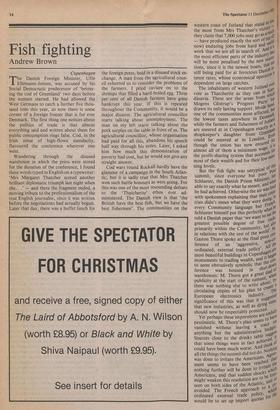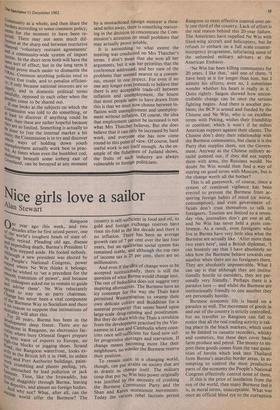Fish fighting
Andrew Brown
Ellemann-Jensen, was accused by his Social Democratic predecessor of `betray- ing the cod of Greenland' two days before the summit started. He had allowed the West Germans to catch a further five thou- sand tons this year, so now there is some corner of a foreign freezer that is for ever Denmark. The first thing one notices about the politics of trade is that almost everything said and written about them for public consumption rings false. Cod, in the Irish sense of high-flown mendacity, flavoured the conference wherever one went.
Wandering through the disused warehouse in which the press were stored for the duration of the conference, I found these words typed in English on a typewriter: 'Mrs Margaret Thatcher scored another brilliant diplomatic triumph last night when she...' — and there the fragment ended, a moving tribute to the professionalism of the true English journalist, since it was written before the negotiations had actually begun. Later that day, there was a buffet lunch for the foreign press, held in a disused stock ex- change. A man from the agricultural coun- cil exhorted us to consider the problems of the farmers. I piled caviare on to the shrimps that filled a hard-boiled egg. Three per cent of all Danish farmers have gone bankrupt this year. If this is repeated throughout the Community, it would be a major disaster. The agricultural councillor starts talking about unemployment. The man on my left starts talking about the pork surplus on the table in front of us. The agricultural councillor, whose organisation had paid for all this, abandons his speech half way through his notes. Later, I asked him how much this demonstration of poverty had cost, but he would not give any straight answer.
Cod wars round Rockall hardly have the glamour of a campaign in the South Atlan- tic, but it is sadly true that Mrs Thatcher won such battle honours as were going. For this was one of the most resounding defeats to the `Thatcherite' ethos ever ad- ministered. The Danish view is that 'the British have the best fish, but we have the best fishermen'. The communities on the
The Spectator 11 December 1982 western coast of Jutland that stand to lose the most from Mrs Thatcher's victorY.,-; they claim that 7,000 jobs may go as a res1 — have produced exactly the sort of OP now) enduring jobs from hard and„ 11,se work that we are all in search of. Aho',,,-1 the most efficient parts of the industrY (P.; will be most penalised by the new reste/;* tions, since it is the newest boats, that still being paid for at ferocious Danish ill; terest rates, whose economical operation dependent on large catches. eee The inhabitants of western Jutland vote as Thatcherite as they can in S; dinavia. These are the areas from Mogens Glistnip's Progress Party "d, drawn its only lasting support. Hvide Sanos one of the communities most affected, bk. the lowest taxes anywhere in Deo°d while the farmers and fishermen of-D.1°4'a are sneered at in Copenhagen exactlY shopkeeper's daughter from Grauttl'a could be sneered at in London. ,e„r though the union has now ensured almost all of them a minimum wage, itof the profit-sharing system that accounts „. most of their wealth and for their low Ma” fling levels. this But the fish fight was untypicaA foal 0 , summit, since everyone but poor 1;11 Schlueter, the Danish Prime Minister, I;t able to say exactly what he meant, and ad he had achieved. Otherwise the air was'°„0. with spokesmen explaining that their e°"ja tries didn't mean what they were doing'ch. every Community language but Pen he Schlueter himself put this perfectly Wherithe told a Danish paper that 'we want to seede, greatest possible degree of free ttraalso primarily within the Community, in relations with the rest of the world • fr Gaston Thorn spoke at the final press °co- ference of an 'aggressive, 111°11T–the ordinated, external trade policY'•are most beautiful buildings in Copenhagen sa monuments to trading wealth, and it lir to seem obtrusively symbolic that the cgia ference was housed in shut-0, af warehouses. M. Thorn got a great daLea publicity at the start of the summit, b, there was nothing else to write about,e circulating copies of his plan to Cr The European electronics industrY. 461 significance of this was that it suggest that new industries, as well as dying °II should now be respectably protected. July Yet perhaps these impressions are 011°,.va vpaenssiismheidstic.wMith. oTuhtornle'asvpinlagn seems t° 114-- anything but the administrative Sources Sources close to the drinks table sogag it that some things were in fact achieve of could have been much worse. And thim`,0a all the things the summit did not do. Notilree,1 was done to irritate the Americans. Agthat ment seems to have been reached to nothing further will be done to Which Americans, Americans, and that sudden shocks vi,,11v.2,, might weaken this resolution are to be 14;0 seen on both sides of the Atlantic, artu,.0. avoided. The French approach to a b'ich ordinated external trade policY, v't the would be to set up import quotas for munity as a whole, and then share the ourdens according to some common policy, j seems for the moment to have been re- fected. There may not seem much dif- :Orerice at the sharp end between restrictive Dilateral 'voluntary restraint agreements' ,,1,1,13 a community-wide system of import woras. In the short term both will have the s,anle sort of effect; but in the long term it Svilbould prove much easier to dismantle the Common anything policies tend to icestrict free trade, and to penalise efficien- eiY' if Only because national interests are so nea. rlY, and in domestic political terms ;41141111Y, opposed to each other when the If oodles come to be shared out. one looks at the subjects on which the a.' sdurnission was told to do something, or d least to discover if anything could be 2oe, then these are rather hopeful because nr are so limited. Something is actually to 1,7 done to free the internal market a bit whc;re, the Commission is to try and discover an'co ways of holding down youth trelliPloYment actually work best in prac- slice. At times when even the humblest cod, qreiterio8 beneath some iceberg east of
eeriland, can be betrayed at any moment by a mustachioed foreign minister a thou- sand miles away, there is something reassur- ing in the decision to concentrate the Com- mission's attention on small problems that may actually prove soluble.
It is astonishing to what extent the meeting was conducted on Mrs Thatcher's terms. I don't mean that she won all her arguments, but it was her priorities that the conference addressed, and her view of the problems that seemed nearest to a consen- sus, except in one respect. For even if no one any longer even pretends to believe that there is any acceptable trade-off between inflation and unemployment, the lesson that most people seem to have drawn from this is that we must now choose between in- flation with unemployment and unemploy- ment without inflation. Of course, the idea that employment cannot be increased is not what Mrs Thatcher believes. But she does believe that it can only be increased by hard work, and everyone else has now come round to this point of view. Of course, hard useful work is not itself enough. As the ex- ample of the fishermen of Jutland shows, the fruits of such industry are always vulnerable to foreign politicians.











































 Previous page
Previous page